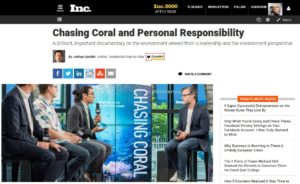Chasing Coral and Personal Responsibility
A brilliant, important documentary on the environment viewed from a leadership and the environment perspective.

While I support their goals, I hope it’s the last “Do as I say, not as I do” documentary. They undermine efforts to change people’s behavior to pollute less.
Here’s the trailer:
Leadership and the Environment
From a leadership perspective, it didn’t motivate action. It raised awareness, but the environment, coral included, doesn’t react to awareness. It reacts to behavior.
A touching scene occurs when the movie makers show the extent of the tragic global coral bleaching they documented. The images of scientists crying broke my heart less for their sadness than for their impotence to do anything effective about it.
The science was clear decades ago. The scientists lacked leadership skills to make a difference. Not that they should have leadership skills, since such skills aren’t relevant for studying nature, but they’re essential for influencing others.
The end suggested that viewers need not change, that some future technology may resolve things, saying almost nothing that viewers can do. On the contrary, I wouldn’t be surprised if they motivated many North Americans to fly to Australia to see the Great Barrier Reef before it died, contributing to its demise.
Here are the greenhouse emissions of one person flying coach round trip New York to Brisbane (source):

That’s a lot!
Their only call to action was to get others to document more, but not to suggest people, especially viewers, change their behavior. Many signs suggest that technology will notsave us. Historically, increases in efficiency often increase total fossil fuel use (called the Jevons paradox and rebound effect).
Do As I Say, Not As I Do
The movie makers flew a lot in the movie, contributing more to coral bleaching than nearly anyone who has ever lived. I’m sure they felt, “yes, we’re contributing to the problem, but just this once is okay since we’re trying to help” or something similar.
Sadly, everyone can justify nearly any behavior that way. I suspect most do, even the people pitching toilet paper whose community the central character abandoned out of a crisis of conscience precipitating the movie.
Personally, I don’t agree with that thinking. I would have preferred they struggled to figure out how to achieve their preservation goals with no hint of “do as I say not as I do.”
Moreover, they make people feel guilty and think “If I act but no one else does it won’t matter.”
I’m glad I watched it, but I would trade all the beautiful imagery for effective leadership that changed people’s behavior and made them enjoy the change. I hope it’s the last documentary I see where the filmmakers don’t live by their values.
In their case, they acknowledged no personal responsibility for contributing more greenhouse gases and pollution than nearly any human in all of history. They are in the top .0001% of greenhouse gas emitters.
Alternatives for future documentarians
I don’t mean the above to put them down. On the contrary, I celebrate their results, but suggest they examine and exit the system they are helping maintain, despite themselves.
What could they have done otherwise?
I’m confident that if they tried to figure out how to pollute less, they would have come up with something. Everyone on my podcast, Leadership and the Environment, does.
We have to decide to act. We have to decide to believe that our actions matter.
Leadership–influencing people’s beliefs and behaviors to act–is necessary to avoid their greatest fear, for coral reefs to be relegated to history books and seed banks for a future where the planet processed our wrecking it, maybe centuries from now.
